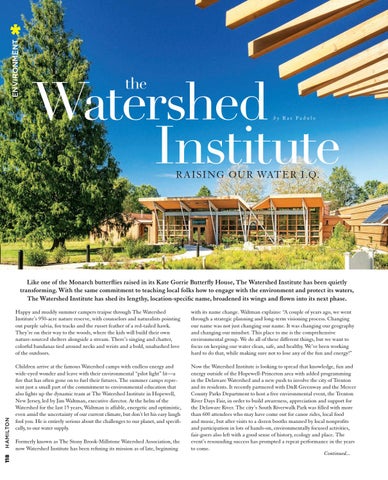ENVIRONMENT 118
HAMILTON
Like one of the Monarch butterflies raised in its Kate Gorrie Butterfly House, The Watershed Institute has been quietly transforming. With the same commitment to teaching local folks how to engage with the environment and protect its waters, The Watershed Institute has shed its lengthy, location-specific name, broadened its wings and flown into its next phase. Happy and muddy summer campers traipse through The Watershed Institute’s 950-acre nature reserve, with counselors and naturalists pointing out purple salvia, fox tracks and the russet feather of a red-tailed hawk. They’re on their way to the woods, where the kids will build their own nature-sourced shelters alongside a stream. There’s singing and chatter, colorful bandanas tied around necks and wrists and a bold, unabashed love of the outdoors.
with its name change. Waltman explains: “A couple of years ago, we went through a strategic planning and long-term visioning process. Changing our name was not just changing our name. It was changing our geography and changing our mindset. This place to me is the comprehensive environmental group. We do all of these different things, but we want to focus on keeping our water clean, safe, and healthy. We’ve been working hard to do that, while making sure not to lose any of the fun and energy!”
Children arrive at the famous Watershed camps with endless energy and wide-eyed wonder and leave with their environmental “pilot light” lit—a fire that has often gone on to fuel their futures. The summer camps represent just a small part of the commitment to environmental education that also lights up the dynamic team at The Watershed Institute in Hopewell, New Jersey, led by Jim Waltman, executive director. At the helm of the Watershed for the last 15 years, Waltman is affable, energetic and optimistic, even amid the uncertainty of our current climate, but don’t let his easy laugh fool you. He is entirely serious about the challenges to our planet, and specifically, to our water supply.
Now the Watershed Institute is looking to spread that knowledge, fun and energy outside of the Hopewell-Princeton area with added programming in the Delaware Watershed and a new push to involve the city of Trenton and its residents. It recently partnered with D&R Greenway and the Mercer County Parks Department to host a free environmental event, the Trenton River Days Fair, in order to build awareness, appreciation and support for the Delaware River. The city’s South Riverwalk Park was filled with more than 600 attendees who may have come out for canoe rides, local food and music, but after visits to a dozen booths manned by local nonprofits and participation in lots of hands-on, environmentally focused activities, fair-goers also left with a good sense of history, ecology and place. The event’s resounding success has prompted a repeat performance in the years to come. Continued...
Formerly known as The Stony Brook-Millstone Watershed Association, the now Watershed Institute has been refining its mission as of late, beginning
